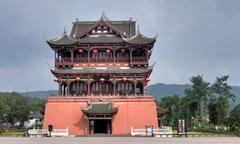Southwest Minzu University Visiting Hours, Tickets, and Chengdu Historical Sites Guide
Date: 03/07/2025
Introduction
Southwest Minzu University (SWUN), located in the dynamic Wuhou District of Chengdu, Sichuan Province, is a cultural and educational landmark renowned for its dedication to China’s ethnic diversity. Established in 1950 to serve the nation’s ethnic minorities, SWUN blends academic excellence, architectural beauty, and vibrant cultural traditions, offering visitors an immersive experience into the heritage of China’s 56 recognized ethnic groups. From its striking campus architecture featuring ethnic motifs to festivals, exhibitions, and interactive workshops, SWUN is a living museum and a gateway to understanding the multicultural fabric of China. Its accessible location, close to iconic sites like Wuhou Shrine and Jinli Ancient Street, makes it a perfect addition to any Chengdu itinerary (Southwest Minzu University Official Website, China Discovery).
Table of Contents
- Welcome to Southwest Minzu University: A Cultural and Historical Landmark in Chengdu
- Essential Visitor Information
- Campus Highlights and What to See
- Photographic Spots and Campus Landmarks
- Special Events and Seasonal Festivals
- Nearby Chengdu Historical Attractions
- Practical Visitor Guide
- Frequently Asked Questions (FAQ)
- Plan Your Visit & Stay Updated
- References
Welcome to Southwest Minzu University: A Cultural and Historical Landmark in Chengdu
SWUN is not just a leading educational institution but a destination where visitors can deeply engage with the cultural traditions, art, and lifestyles of China’s ethnic minorities. The campus’s unique architecture, bilingual signage, and varied cultural programming provide an authentic window into the rich tapestry of Chinese society. Whether you are a cultural enthusiast, academic, or traveler, a visit to SWUN offers an unparalleled journey into the heart of China’s multicultural heritage.
Essential Visitor Information
Visiting Hours
- Campus Grounds: Open daily from 8:00 AM to 6:00 PM.
- Ethnic Museum: Typically open from 9:00 AM to 5:00 PM, Tuesday to Sunday (closed Mondays and major Chinese holidays). Verify specific hours for special events or holidays in advance.
Tickets and Admission
- General Campus Entry: Free of charge.
- Ethnic Museum & Special Exhibitions: Usually free; some exhibitions or events may require a nominal ticket fee (approx. 20 RMB). Book tickets onsite or via the university’s official website.
Location and Transportation
- Address: #16, South Section, 1st Ring Road, Chengdu, Sichuan, China, 610041 (UniEdu).
- Access: Reachable via Chengdu Metro Line 3 (Southwest Minzu University Station), city bus routes, and taxis. Both Chengdu Shuangliu International Airport and Tianfu International Airport have convenient connections to the university via public transit or taxi (Ruqin Travel).
Accessibility Features
- Ramps, elevators, and accessible pathways are present across most buildings.
- Accessible restrooms and shuttle services are available for visitors with mobility needs.
Campus Highlights and What to See
Ethnic Culture Museum
- Home to an extensive collection of artifacts and exhibits representing China’s 56 ethnic groups, with a focus on those from Southwest China.
- Features Tibetan thangka, Miao silver jewelry, Yi embroidery, interactive displays, and multimedia presentations.
Library and Academic Facilities
- SWUN’s library holds over 2 million volumes, including rare books and materials in minority languages.
- The modern facility features expansive reading halls and a rooftop garden with scenic views.
Student Activity Centers
- The Ethnic Minority Student Activity Center hosts festivals, dance and music performances, and language workshops.
- Decorated with motifs representing Tibetan, Qiang, and Yi cultures.
Scenic Gardens and Lakes
- The campus’s central lake is surrounded by landscaped gardens, pavilions, and pathways, ideal for relaxation and photography (China Discovery).
Sports and Performance Venues
- Facilities include a gymnasium, track and field stadium, courts, swimming pool, and venues for martial arts and ethnic games.
- University Art Gallery and Concert Hall host rotating exhibitions and performances, especially during major festivals.
Dining and Social Spaces
- Ethnic Cuisine Dining Hall serves authentic dishes from minority regions, such as Tibetan yak butter tea and Yi roasted lamb.
- Student cafés and teahouses offer spaces for socializing and enjoying Chengdu’s renowned tea culture (Living Nomads).
Photographic Spots and Campus Landmarks
- Ethnic Unity Monument: Central symbol of the university’s dedication to unity in diversity.
- Traditional Gateways and Bridges: Designed in styles representing various ethnic groups, especially beautiful at sunrise/sunset.
- Campus Gardens and Pavilions: Popular spots during cherry blossom and ginkgo seasons.
Special Events and Seasonal Festivals
- Spring and Autumn: Celebrate Tibetan Losar, Yi Torch Festival, and Miao Sisters’ Festival with parades, music, and handicrafts.
- Academic Conferences and Public Lectures: Periodic events on ethnic studies and intercultural communication, sometimes in English.
- Annual Ethnic Minority Cultural Festival: Features performances, food fairs, and traditional crafts.
Check the university’s event calendar or website for schedules and information on public access.
Nearby Chengdu Historical Attractions
- Wuhou Shrine: A major temple complex dedicated to Zhuge Liang of the Three Kingdoms era, located close to SWUN.
- Jinli Ancient Street: Famous for Sichuan architecture, local snacks, and traditional crafts.
- Du Fu Thatched Cottage and Mount Qingcheng: Other notable historic and natural sites easily accessible from campus (China Discovery).
Practical Visitor Guide
Campus Navigation and Services
- Campus maps are available at entrances and information desks; signage is in Chinese and increasingly in English.
- Information centers near main gates offer assistance, directions, and basic English support.
Guided Tours
- Available in Chinese and English; advance booking recommended via the International Office or online.
- Tours typically last 1.5 hours and cover major landmarks, museums, and cultural facilities.
Facilities and Amenities
- Modern restrooms, drinking water stations, and vending machines throughout campus.
- Free Wi-Fi in libraries, cafeterias, and select areas (may require local phone verification).
- On-campus guesthouses for visiting scholars (advance arrangement required); numerous hotels nearby (Living Nomads).
Cultural Etiquette
- Modest attire recommended in academic and cultural spaces.
- Smoking is prohibited indoors and in designated outdoor zones.
- Respect quiet zones in academic buildings and always ask before photographing individuals.
Language and Communication
- Mandarin is the primary language; English is used in international programs and on signage in key areas.
- Translation apps such as Google Translate and Baidu Translate are helpful.
Safety and Emergency Contacts
- Campus is secure with 24-hour security and surveillance.
- Emergency numbers posted at gates; dial 110 for police and 120 for medical emergencies.
- Campus clinic provides basic healthcare; major hospitals are nearby.
Frequently Asked Questions (FAQ)
Q: What are the visiting hours for Southwest Minzu University and its Ethnic Museum?
A: Campus: 8:00 AM–6:00 PM daily; Museum: 9:00 AM–5:00 PM, Tuesday–Sunday (closed Mondays and holidays).
Q: Do I need to buy tickets?
A: General campus access is free; a small fee may apply to some museum exhibits or special events.
Q: Are guided tours available?
A: Yes, in Chinese and English, with advance booking recommended.
Q: Is the campus accessible for visitors with disabilities?
A: Yes, with ramps, elevators, accessible restrooms, and shuttle services.
Q: How do I get there from Chengdu airports?
A: Use taxis, airport shuttles, or the Chengdu Metro (Line 10 from Shuangliu Airport).
Q: Are there accommodations nearby?
A: Yes, including on-campus guesthouses (for official guests) and a wide range of hotels in Chengdu.
Q: What is the best season to visit?
A: Spring and autumn, during campus festivals and when gardens are in bloom.
Plan Your Visit & Stay Updated
To make the most of your visit, check the latest hours, book tours in advance, and consult the university’s official website for up-to-date event calendars. Download essential apps like WeChat and Didi for communication and transportation, and explore related Chengdu historical sites for a full cultural experience. For ongoing updates, follow SWUN on social media or use travel platforms for real-time information.
References
- Southwest Minzu University Official Website
- China Discovery: Chengdu Tourism Guide
- UniEdu: Southwest Minzu University
- ISAC Teach: Southwest Minzu University
- Living Nomads: Best Things to Do in Chengdu
- Ruqin Travel: How to Visit Chengdu

